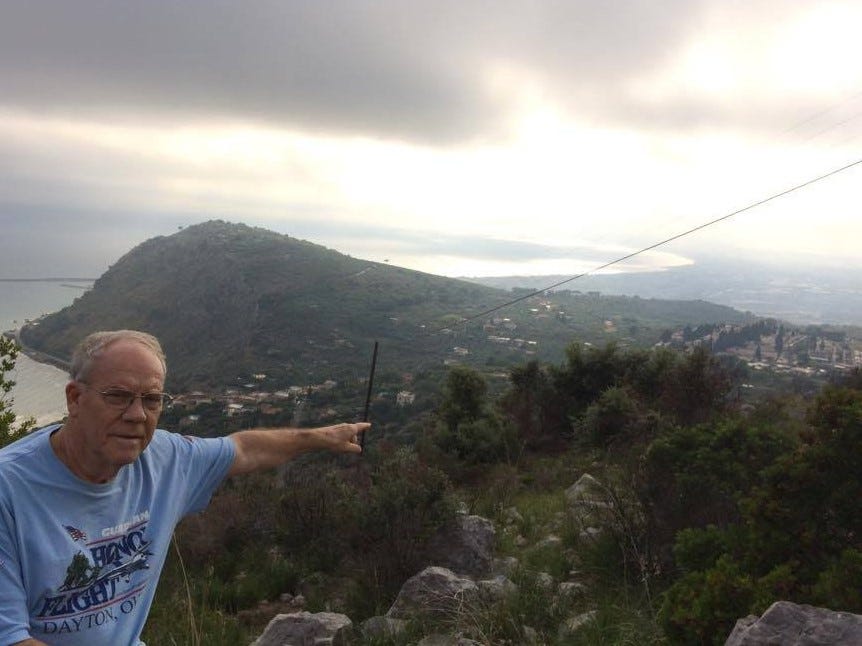Dad's WWII Soldier Believed In Premonition
NOTE: While preparing to arrange a memorial service for my father in 2012, I unloaded one box containing my dad's war stuff and found his written story (see below).
I submitted it to the Ohio Departments of Aging and Veterans Services one year later. Dad’s story was portrayed in the seventh installment of their “War Era Story Project” on November 3, 2013.
Unfortunately, the link about this project was discontinued, but I found a copy of my dad’s story in my email box. Of course, I added some links and photos for your reading.
A War Experience
During World War II, I was a reserve officer in a division of all draftee soldiers. I was the second platoon leader in a heavy weapons company. I was part of the cadre of regular army officers and reserve officers who formed the company nearly two years before.
Our 85th Division of the Fifth U.S. Army Corp was sent to Italy and entered combat in a defensive line north of Naples. During the second major battle that we were in, our company executive officer was killed by machine gun fire, and I was moved to Executive Officer. A short time later, our Battalion Command Post was hit by artillery fire, killing the battalion commander and two staff officers. My company commander was moved to the Battalion, and I was named acting company commander. Our company had 50-caliber water-cooled machine guns and 81-millimeter mortars. Here I was, a farm boy from the hills of West Virginia, 27 years old and scared nearly to death, responsible for over 200 soldiers and myself.

Late one evening in October 1944, while we were in defensive positions awaiting orders to move forward, Staff Sergeant Dale Franquet came to my foxhole and saluted me. The salute on the front line was very unusual because all movement must be minimal in daylight. I knew that something must be up, so I returned the salute. Dale said to me, “Lieutenant, will you do me a favor.” I said sure if I could. Dale handed me his billfold, watch, wedding ring, and a letter to his wife. He said, “Will you please see that these are mailed to my wife?” I asked why, and he told me that he was going to die very soon. I was shocked and felt I needed support, so I called back to Battalion Headquarters and asked our Chaplain to come forward.
Dale said he believed in premonition and that his time was near. The Chaplain came very quickly, and the three of us talked. Dale was Catholic, and the Chaplain was Protestant. Dale quoted scripture passages to back up his belief. The Chaplain read some scriptures. I told Dale I would transfer him to another platoon or company. Dale said that would not help because it would happen wherever he was. The Chaplain then opened his briefcase and took out three communion cups, wafers, and juice, and we had communion. We talked some more and had more prayers. Then Dale saluted again and returned to his firing position. The Chaplain and I talked some more; then he returned to the Battalion.
Later that very night, a mortar round made a direct hit on Dale’s foxhole, and he was killed instantly. The Litter Bearers were called forward, and his body was removed before daylight. Needless to say, the items were mailed to his wife along with a letter from me telling his wife what a good soldier he had been and the details of this experience and details of his death.
Written by Paul E. Gorrell of Dayton, OH, Captain, Army of United States on May 26, 2003. (Notice: Paul E. Gorrell passed away on August 9, 2012, at the age of 95.)
~~~~~~~~~~~~~~~~~~~~~~~~~~~~~~~~~~
The American Battle Monuments Commission website has mentioned that Technical Sergeant Dale K.C. Franquet of Northumberland, Pennsylvania, died on October 14, 1944. The location of his burial is at Plot B, Row 2, Grave 9, in the Florence American Cemetary.
Franquet received the Bronze Star and the Purple Heart. The location where he got killed is around Monterenzio, Italy (22 miles south of Bologna.)
“They were young men, but the grime and whiskers and exhaustion made them look middle-aged. In their eyes as they passed was no hatred, no excitement, no despair, no tonic of their victory—there was just the simple expression of being there as if they had been there doing that forever, and nothing else,” quoted Ernie Pyle, WWII correspondent in Italy.



